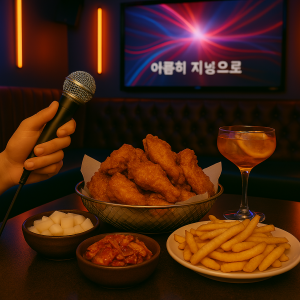
There’s something deeply satisfying about belting out your favorite tunes with friends, clutching a mic and a piece of golden, crispy fried chicken in the other. In South Korea—and increasingly worldwide—karaoke (known locally as noraebang) and Korean fried chicken (yangnyeom or huraideu chikin) go hand in hand. But why does this pairing work so well? Why do fried chicken and karaoke feel like soulmates? To understand the magic of this combo, you have to look at, and how they all blend to create something greater than the sum of their parts. Even at places like 호치민 가라오케, the mix of music and comfort food helps turn a casual night out into something memorable.
A Culture of Shared Experience
South Korea is a collectivist society, and many of its most beloved pastimes center around shared experiences. Meals are communal. Drinking is social. And karaoke is never done solo unless you’re warming up. The noraebang isn’t just a place to sing—it’s where bonds are formed, stress is released, and inhibitions are dropped.
Now add fried chicken to the mix. Not just any chicken, but Korean-style fried chicken—double-fried for extra crispiness, sauced to perfection, and usually served in generous, shareable portions. It’s meant to be eaten with others, usually alongside beer (chimaek, short for chicken and maekju, or beer). The whole setup is a social lubricant. You sing, you eat, you drink, you laugh. The barriers drop. You’re in it together.
The Soundtrack to a Late Night Feast
Karaoke and Korean fried chicken both hit their stride at night. After work, dinner, and drinks, the streets of Seoul light up with neon and the real socializing begins. People might head to a pocha (a street-side tent bar), grab some chicken for the table, and then roll into a noraebang to keep the night alive.
It’s about pacing, too. You can’t go all-out at karaoke without fuel. Fried chicken provides the perfect balance of energy and indulgence. It’s rich and satisfying but not so heavy that it slows you down. The heat from the gochujang-based sauces, the crunch of pickled radish on the side—it’s a sensory experience that complements the adrenaline of singing your heart out.
A Combo Built on Contrast
There’s also something to be said about contrast. Korean fried chicken is hot, spicy, messy. Karaoke is loud, performative, and often silly. But that’s the point. These two experiences balance each other out. The chicken gives you something tactile, grounding you between choruses. The karaoke permits you to let go, laugh off the awkwardness, and maybe surprise yourself with how good or bad you are at singing.
This contrast keeps the night dynamic. When you need a break from singing, you eat. When your hands are too greasy to handle chicken, you sing. It’s a rhythm, a back-and-forth, that keeps the night flowing.
Global Appeal, Local Roots
What started in Korea has gone global. Cities like Los Angeles, New York, and Toronto have seen a boom in Korean fried chicken restaurants that double as karaoke bars or sit next to one. The appeal is universal. People everywhere crave community, comfort food, and an excuse to let loose.
And yet, even as the combo travels, it keeps its roots. Many of these establishments still follow Korean customs—private rooms instead of open stages, call buttons at the table, and pitchers of beer alongside soju bottles. It’s a cultural export that doesn’t need to change much to find an audience. The formula works.
Not Just Food and Fun—A Ritual
For many Koreans, especially young people, a night of karaoke and fried chicken is more than entertainment. It’s a ritual. It marks celebrations, ends bad days, and fills the awkward gap between dinner and going home. It’s a form of self-care wrapped in spicy sauce and powered by pop music.
You don’t need to be a good singer. You don’t need to know every K-pop hit. What matters is showing up, being present, and diving into the moment with whoever’s next to you. It’s casual, it’s fun, and it’s disarmingly sincere.
Final Thoughts
Some food pairings make sense because of flavor, others because of tradition. But Korean fried chicken and karaoke work because they bring people together. They create an atmosphere where joy is the main course, and connection is the goal.
So skip the bar scene the next time you find yourself with friends, a mic, and a craving. Find a noraebang. Order the chicken. And sing like no one’s judging—because in that room, with those people, under that flickering disco light, no one is.

